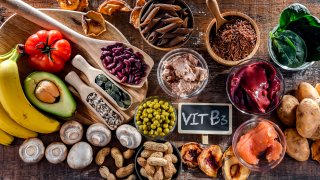
High levels of niacin, an essential B vitamin, may raise the risk of heart disease by triggering inflammation and damaging blood vessels, according to new research.
According to NBC News, the report published Monday in Nature Medicine, revealed a previously unknown risk from excessive amounts of the vitamin, which is found in many foods, including meat, fish, nuts, and fortified cereals and breads.
The recommended daily allowance of niacin for men is 16 milligrams per day and for women who are not pregnant is 14 milligrams per day.
About 1 in 4 Americans has higher than the recommended level of niacin, said the study’s senior author, Dr. Stanley Hazen, chair of cardiovascular and metabolic sciences at the Cleveland Clinic’s Lerner Research Institute and co-section head of preventive cardiology at the Heart, Vascular and Thoracic Institute.
Get top local stories in Philly delivered to you every morning. >Sign up for NBC Philadelphia's News Headlines newsletter.
The researchers currently don’t know where to draw the line between healthy and unhealthy amounts of niacin, although that may be determined with future research.
"The average person should avoid niacin supplements now that we have reason to believe that taking too much niacin can potentially lead to an increased risk of developing cardiovascular disease,” Hazen said.
Currently, Americans get plenty of niacin from their diet since flour, grains and cereals have been fortified with niacin since the 1940s after scientists discovered that very low levels of the nutrient could lead to a potentially fatal condition called pellagra, Hazen said.
Prior to the development of cholesterol-lowering statins, niacin supplements were once even prescribed by doctors to improve cholesterol levels.
To search for unknown risk factors for cardiovascular disease, Hazen and his colleagues designed a multipart study that included an analysis of fasting blood samples from 1,162 patients who had come into a cardiology center to be evaluated for heart disease. The researchers were looking for common markers, or signs, in the patients’ blood that might reveal new risk factors.
The research resulted in the discovery of a substance in some of the blood samples that is only made when there is excess niacin.
That finding led to two additional “validation” studies, which included data from a total of 3,163 adults who either had heart disease or were suspected of having it. The two investigations, one in the U.S. and one in Europe, showed that the niacin breakdown product, 4PY, predicted participants’ future risk of heart attack, stroke and death.
The final part of the study involved experiments in mice. When the rodents were injected with 4PY, inflammation increased in their blood vessels.
The results are “fascinating” and “important,” said Dr. Robert Rosenson, director of metabolism and lipids for the Mount Sinai Health System in New York City.
The newly detected pathway to heart disease might lead to the discovery of a medication that could reduce blood vessel inflammation and decrease the likelihood of major cardiovascular events, he added.
Rosenson hopes that the food industry will take note and “stop using so much niacin in products like bread. This is a case where too much of a good thing can be a bad thing.”
The new information could influence dietary recommendations for niacin, said Rosenson, who was not involved with the Cleveland Clinic research.
Scientists have known for decades that a person’s cholesterol level could be a major driver of heart disease, said Dr. Amanda Doran, an assistant professor of medicine in the division of cardiovascular medicine at the Vanderbilt University Medical Center.
Even when patients’ cholesterol levels were brought down, some continued to have a high risk of heart attacks and stroke, Doran said, adding that a 2017 trial suggested that the increased risk might be related to blood vessel inflammation.
Doran was surprised to learn that niacin could be involved in driving up the risk of heart disease.
“I don’t think anyone would have predicted that niacin would have been pro-inflammatory,” she said. “This is a powerful study because it combines a variety of techniques: clinical data, genetic data and mouse data.”
Finding the new pathway may allow future researchers to discover ways to reduce blood vessel inflammation, Doran said.
“It’s very exciting and promising,” she said.
This story first appeared on NBCNews.com. More from NBC News:



